
Fine Gael ( FEEN-nə GAYL, FIN-, Irish:[ˌfʲɪnʲəˈɡeːl̪ˠ]; English: "Family of the Irish" is a liberal-conservative and Christian democratic political party in Ireland. Fine Gael is currently the third-largest party in the Republic of Ireland in terms of members of Dáil Éireann. The party had a membership of 25,000 in 2021. Simon Harris succeeded Leo Varadkar as party leader on 24 March 2024.

Denis Naughten is an Irish independent politician who has been a Teachta Dála (TD) for the Roscommon–Galway constituency since 2016, and previously from 2007 to 2016 for the Roscommon–South Leitrim constituency and from 1997 to 2007 for the Longford–Roscommon constituency. He was appointed Chair of the Committee on Social Protection, Community and Rural Development and the Islands in September 2020. He previously served as Minister for Communications, Climate Action and Environment from 2016 to 2018. He was a Senator for the Agricultural Panel from January 1997 to June 1997.
Billy Timmins is an Irish former politician. He was a Teachta Dála (TD) for the Wicklow constituency from 1997 until the 2016 general election. He was the deputy leader of Renua from the foundation of the party in March 2015 until May 2016. He previously sat as an Independent TD, having lost the Fine Gael parliamentary party whip in July 2013.
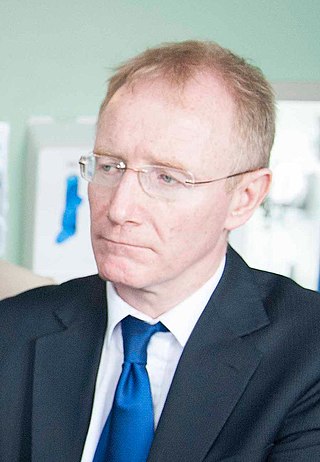
Frank Feighan is an Irish Fine Gael politician who has been a Teachta Dála (TD) for the Sligo–Leitrim constituency since 2020, and previously from 2007 to 2016 for the Roscommon–South Leitrim constituency. He served as a Minister of State at the Department of Health from July 2020 to December 2022. He previously served as a Senator for the Administrative Panel from 2002 to 2007 and from 2016 to 2020, after being nominated by the Taoiseach.
Paul Bradford is an Irish former politician who served as a Senator for the Agricultural Panel from 1987 to 1989 and 2002 to 2016. He served as a Teachta Dála (TD) for the Cork East constituency from 1989 to 2002.

Thomas Broughan is an Irish former Independent politician who served as a Teachta Dála (TD) from 1992 to 2020.
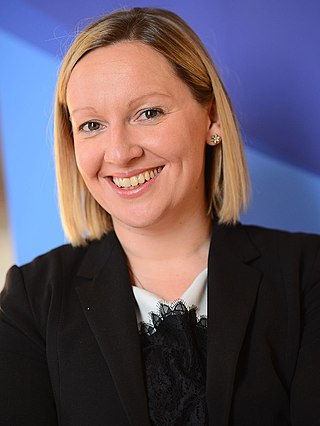
Lucinda Creighton is an Irish businesswoman and former politician, who served as Minister of State for European Affairs from 2011 to 2013. She was leader of Renua from its March 2015 foundation until May 2016, and served as a Teachta Dála (TD) representing Dublin South-East from 2007 to 2016.
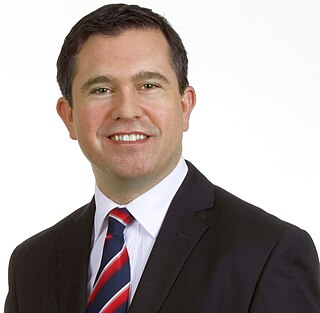
Terence Flanagan is an Irish Fine Gael politician who served as a Dublin City Councillor from 2019 to 2024. He previously served as a Teachta Dála (TD) for the Dublin North-East constituency from 2007 to 2016.
Fine Gael is a political party in Ireland, formed in 1933 as a merger of Cumann na nGaedheal, the National Centre Party, and the Blueshirts.

The 2016 Irish general election to the 32nd Dáil was held on Friday 26 February, following the dissolution of the 31st Dáil by President Michael D. Higgins on 3 February, at the request of Taoiseach Enda Kenny. The general election took place in 40 Dáil constituencies throughout Ireland to elect to elect 158 Teachtaí Dála to Dáil Éireann, the house of representatives of the Oireachtas. There was a reduction of eight seats under the Electoral (Amendment) Act 2013.
The 31st Dáil was elected at the 2011 general election on 25 February 2011 and first met at midday on 9 March 2011 in Leinster House. The members of Dáil Éireann, the house of representatives of the Oireachtas (legislature) of Ireland, are known as TDs. It sat with the 24th Seanad as the two Houses of the Oireachtas.

The United Left Alliance was an electoral alliance of left-wing political parties and independent politicians in the Republic of Ireland, formed to contest the 2011 general election. The grouping originally consisted of three existing political parties, the Socialist Party, the People Before Profit Alliance (PBPA), and the Workers and Unemployed Action Group (WUAG), as well as former members of the Labour Party.

Peter Mathews was an Irish economist and politician who served as a Teachta Dála (TD) for the Dublin South constituency from 2011 to 2016.

Helen McEntee is an Irish Fine Gael politician who has served as Minister for Justice since June 2020, although her portfolio was temporarily reassigned during two six-month periods of maternity leave in 2021 and 2022–2023. A Teachta Dála (TD) for the Meath East constituency since 2013, she previously served as a minister of state from 2016 to 2020.
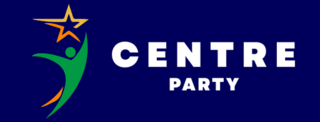
The Centre Party of Ireland, formerly Renua, is a fringe political party in Ireland. The party was launched on 13 March 2015, with former Fine Gael TD Lucinda Creighton as founding leader. Prior to its launch it had used the slogan Reboot Ireland. The name Renua was intended to suggest both the English Renew and the Irish Ré Nua "New Era". The party changed its name to the Centre Party of Ireland in 2023.
The 32nd Dáil was elected at the 2016 general election on 26 February and first met at 10.30 a.m. on 10 March 2016. The members of Dáil Éireann, the house of representatives of the Oireachtas (legislature) of Ireland, are known as TDs. It sat with the 25th Seanad as the two Houses of the Oireachtas.
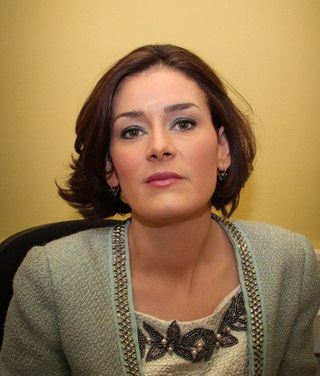
Kate O'Connell is an Irish former Fine Gael politician who served as a Teachta Dála (TD) for the Dublin Bay South constituency from 2016 to 2020. During her time in the Dáil, O'Connell campaigned in favour of abortion rights as well as pushing for more funding for healthcare services in Ireland.

The 2020 Irish general election took place on Saturday 8 February, to elect the 33rd Dáil, the lower house of Ireland's parliament. The election was called following the dissolution of the 32nd Dáil by the president, at the request of the Taoiseach, Leo Varadkar, on 14 January 2020. The members, Teachtaí Dála (TDs), were elected by single transferable vote in multi-seat constituencies. It was the first election since 1918 to be held on a weekend.
The events surrounding the formation of Ireland's government in 2016 took place during March, April and May of that year, following the general election held on 26 February, which failed to produce an overall majority for any of the country's outgoing political alliances and resulted in a hung parliament.













